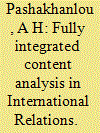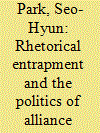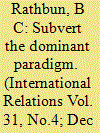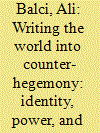|
|
|
Sort Order |
|
|
|
Items / Page
|
|
|
|
|
|
|
| Srl | Item |
| 1 |
ID:
157104


|
|
|
|
|
| Summary/Abstract |
This article contributes the insight that during an international crisis, a pre-existing state of complex interdependence can help to preserve cooperation. It derives the insight from a case study on the International Relations of the Arctic before and after the 2014 Russian annexation of Crimea. The case study is examined through the lens of Robert Keohane and Joseph Nye’s concept of ‘complex interdependence’, as developed in their 1977 book Power and Interdependence – a concept which provides the analytical breadth necessary for a multifactorial situation of regional cooperation and conflict. It finds that Arctic international relations had achieved a state of complex interdependence by 2014, and that some important elements of interdependence then disappeared after the annexation of Crimea. But while most military and economic cooperation between Russia and Western states was suspended, many aspects of regional cooperation continued, including on search and rescue, fisheries, continental shelves, navigation and in the Arctic Council. The question is, why has Arctic cooperation continued in some issue areas while breaking down in others? Why have Russian–Western relations in that region been insulated, to some degree, from developments elsewhere? The concept of complex interdependence provides some answers.
|
|
|
|
|
|
|
|
|
|
|
|
|
|
|
|
| 2 |
ID:
157107


|
|
|
|
|
| Summary/Abstract |
Content analysis has once again come to the forefront of discussions regarding methods in International Relations (IR). The first wave of content analysis in IR lasted from the 1940s to the 1960s and was marked by a commitment to quantitative and manual analyses. The second wave of content analysis appeared at the start of the third millennium and continues to pervade the discipline. As with the first wave, it proceeds in a predominantly quantitative manner but emphasizes computer-assisted analysis rather than manual analysis. Critics and advocates of the method alike have, highlighted numerous shortcomings with these approaches. In order to address these limitations, the present investigation argues for a fully integrated content analysis that has the potential to ameliorate the identified weaknesses that have hitherto plagued the method. It accomplishes this task by combining all facets of the method: quantitative, qualitative, manual, and computer-assisted content analyses within a single research project.
|
|
|
|
|
|
|
|
|
|
|
|
|
|
|
|
| 3 |
ID:
157106


|
|
|
|
|
| Summary/Abstract |
In attempting to bring the frame of war more directly into the discussion over humanitarian intervention in the early 1990s, Adam Roberts quipped that ‘“humanitarian war” is an oxymoron that may yet become a reality’. No longer was humanitarianism only meant to restrain the means of warfare, but the violent and political logic of war was now supposed to serve the caring and universal dictates of humanitarianism. This essay takes the chance to theorize the idea of humanitarian war further to help improve our understanding of the reality that has become of it, where not only humanitarian interventions or coercive enactments of the ‘Responsibility to Protect’ feature humanitarian casus belli, but even more geopolitically motivated wars often do as well. It notes how scholarship on such phenomena often rests on overly restrictive and sometimes only implicit notions of how a humanitarian justification can and does influence the practice of war. It then offers a deeper and more plausible theorization of humanitarian war, laying out a range of possible forms and a central tendency that ties them together. This essay closes by discussing some of the benefits of grounding future analyses of humanitarian war in the theorization on offer.
|
|
|
|
|
|
|
|
|
|
|
|
|
|
|
|
| 4 |
ID:
157109


|
|
|
|
|
| Summary/Abstract |
This article is about rhetorical framing and its effects on foreign policy outcomes – specifically in intra-alliance relations. It argues that leaders’ attempts to change the framing of existing security concepts alter the context – and cost – of alliance cooperation. In particular, I highlight the mechanism of rhetorical entrapment as the causal link between initial rhetorical action and the changed context of alliance cooperation. While previous studies of rhetorical entrapment have focused on individual-level reputational costs – such as moral shaming or political backlash when hypocrisy is exposed – I focus on the socially constructed nature of political rhetoric and the consequences of language use. That is, I explore why leaders are compelled to choose certain security rhetoric in the first place and how social resonance and audience receptivity can present unintended political constraints and hidden costs. In this way, the findings from this article contribute to two separate bodies of work in the field of International Relations that have yet to be examined closely in tandem: the role of foreign policy rhetoric employed by leaders as part of their political legitimation strategies, and the domestic politics of alliance cooperation. Through comparative case studies of Japan and South Korea prior to and during the early stages of the Iraq War, I demonstrate the role of rhetorical entrapment in explaining the politics of alliance cooperation.
|
|
|
|
|
|
|
|
|
|
|
|
|
|
|
|
| 5 |
ID:
157105


|
|
|
|
|
| Summary/Abstract |
It is frequently maintained that rationalism is something other than an ‘ism’ of International Relations. Inspired by critical theory but using quantitative survey data, this article takes issue with that notion, arguing that rationalist work – with its emphasis on interests, institutions, and information – has a distinct logic of individualistic utilitarianism. It therefore exhibits all of the subjective biases of other ‘isms’, defining both the answers and the very questions that are asked. Using data from the 2011 TRIP survey, I show that those substantive commitments reveal themselves in the economic ideology of those who make rationalist assumptions in their work. Parallel to a view of international relations in which egoistic units seek material gains, rationalists identify as economic libertarians at a much higher rate than non-rationalists. All of this suggests that rationalists have an unacknowledged and unconscious bias in their scholarship that threatens the positivistic epistemology to which most claim to be committed.
|
|
|
|
|
|
|
|
|
|
|
|
|
|
|
|
| 6 |
ID:
157108


|
|
|
|
|
| Summary/Abstract |
This article is an attempt to develop a theoretical framework about how to study dissident ethnic movements’ foreign policies. Is it possible to speak about foreign policies of ethnic dissident movements, especially when it is considered that they have no characteristics of modern sovereignty such as territory and recognition? For example, do the Berbers in Morocco, the Catalans in Spain, the Balochs in Iran, and the Kurds in Turkey have a foreign policy? If they do, how do we study their policies toward the outside world? Specifically, focusing on the case of the Kurds in Turkey, this article attempts to provide a theoretical framework for how to study dissident ethnic movements’ foreign policy performances. By looking at the effect of the end of the Cold War on the Kurdish nationalists’ imagination of the United States, this article interrogates how the change in their imagination played a role in the construction and reconstruction of the post-1980 Kurdish identity in Turkey. It also draws on the work of poststructural and postcolonial Ernesto Laclau, David Campell, and Edward W. Said in order to develop the theoretical framework.
|
|
|
|
|
|
|
|
|
|
|
|
|
|
|
|
|
|
|
|
|